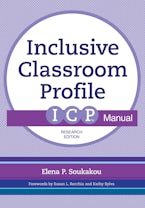The ICP™ manual guides users on understanding, implementing, and scoring the ICP.
How well is your early childhood program implementing quality inclusive practices? Now there’s a comprehensive, field-tested observational tool that uncovers the answers. A one-of-a-kind tool for classrooms serving children ages 2–5, the Inclusive Classroom Profile (ICP™) assesses 12 key practices with the strongest research base for supporting the education and development of young children in inclusive programs:
•Adaptations of Space, Materials, and Equipment
•Adult Involvement in Peer Interactions
•Adults' Guidance of Children’s Free-Choice Activities and Play
•Conflict Resolution
•Membership
•Relationships between Adults and Children
•Support for Communication
•Adaptation of Group Activities
•Transitions between Activities
•Feedback
•Family-Professional Partnerships
•Monitoring Children's Learning
Benefits
The in-depth ICP™ evaluation process gives you the rich information and insights you need to:•assess your program’s current inclusive practices
•establish a baseline for measuring future progress
•apply recommended inclusive practices for young children
•guide quality improvement efforts by linking assessment data with instructional decision-making
•tailor professional development to teachers' specific needs

